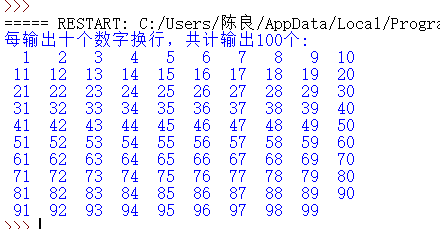循环语句
//缩进==放入循环体内部,因此语句的缩进很重要
1 while ans < 5: 2 print("sger") 3 cnt+=1#循环体内部。5次 4 ans +=2#循环体内部,因为缩进了(易错)。3次 5 6 7 8 9 10 11 #只会打印一个0 12 while cnt <5: 13 if cnt%2==0: 14 print(cnt) 15 cnt+=1#是if 的语句 16 17 18 19 #0,2,4 20 while cnt <5: 21 if cnt%2==0: 22 print(cnt) 23 cnt+=1#是 while 的语句 24
>>> for i in range(3,-1,-1): ... print(i); 注意缩进 File "<stdin>", line 2 print(i); ^ IndentationError: expected an indented block >>> for i in range(3,-1,-1): ... print(i) ... 3 2 1 0
import math ch = "" while ch != "q": a = float(input("a: ")) b = float(input("b: ")) c = float(input("c: ")) if a!=0: d = b**2-4*a*c if d<0: print ("no solution!") elif d==0: s = -b/(2*a) print("s: ",s) else: r = math.sqrt(d) s1 = (-b+r)/(2*a) s2 = (-b-r)/(2*a) print ("Two distinct solutions are : ",s1,s2) ch = input("Quit? ")#缩进要缩对,在while循环体内
# break and continue #break 结束当前循环体 cnt = 0 while cnt < 5: if cnt > 2: break print("okokok!") cnt+=1 okokok! okokok! okokok! #continue 结束当次循环 cnt = 0 while cnt < 5: cnt+=1 if cnt > 2: continue print("okokok!") okokok! okokok!
1 s = 0 2 for i in range(11): #range 生成0,……,10的序列 3 s += i#同样要注意缩进 4 print ("s= :",s)


1 import math 2 e = 1 3 for i in range(1,10): 4 e+=1/math.factorial(i) 5 print(e)

1 import math 2 e = 1 3 fac = 1 4 for i in range(1,10): 5 fac*=i 6 e+=1/fac 7 print(e)

1 n = 6 2 while n!= 1: 3 if n%2 ==0: 4 n /=2 5 else: 6 n = n*3+1 7 print ("n = :{:.0f}".format(n))
#注意下输出的格式 print("每输出十个数字换行,共计输出100个:") for num in range(1,100):#循环一百次 print("%3d" % num, end=" ")#不换行输出 if(num % 10 == 0): print("")#换行输出

1 for i in range(1,10): 2 for j in range(1,10): 3 print("%3d" % (i*j), end = " ") 4 print("")
s = ('acf','af',133) for i in s : print(i,end=',') acf,af,133, >>> s = "python" while s!='': for c in s: if c == 't': break#一个break只能跳出一个循环 print(c,end='') print('\n') s = s[:-1] py py py py py p s = "python" for i in s: print(i) else:#当循环没有break语句退出时,执行else语句块。else 语句块作为正常完成循环的奖励 print('不是o') p y t h o n 不是o
无限循环用ctrl+c 停止
#水仙花数 s = '' for i in range(100,1000): sum = 0 for j in str(i): sum+=pow(eval(j),3) if sum==i: s+="{},".format(i) print(s[0:-1])
字典循环
dict= ['a','b','c'] for i ,val in enumerate(dict): print(i,':',val) 0 : a 1 : b 2 : c


 浙公网安备 33010602011771号
浙公网安备 33010602011771号